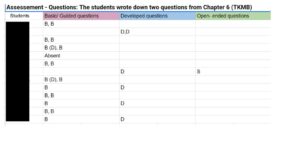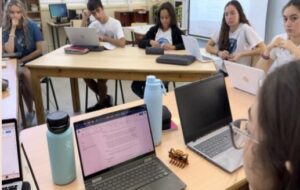From Superficial to Substantial: Teaching Students to Ask Deeper Questions
Student-led discussions such as socratic seminars, TQE’s or fishbowl discussions, help students take charge of their own learning. However, the quality of these debates depend on students’ ability to move the discussion along with deep, thoughtful questions. In classes where enough students have strong questioning skills, discussions will be rich and dynamic. But in classes where few students are strong in this area, discussions will languish, remaining superficial and dying out quickly. And even if many of our students have the ability to come up with the questions that will enrich a discussion, we have to ask ourselves, shouldn’t we help all students develop this crucial skill?
Our 10th Grade Language Arts teacher, Angeliki, found that very few of her students were participating in class discussions and, when they did, they answered questions superficially. They didn’t build on each other’s answers or ask questions of each other. Many of her students never said anything at all in class. She tried using strategies to build their confidence and she used a repertoire of questions — such as “Could you elaborate further on that point?” (from Hacking Questions by Connie Hamilton) — to help them go deeper in their thinking, but nothing worked.
One day she had an aha moment. As a quick check-in to see who had done their reading, she had asked her students to write questions about the chapter of To Kill a Mockingbird they had just read. In general she found that her students asked simple, closed questions that didn’t require insight or a deeper level of understanding such as:
- What was the excuse Dill gave Atticus?
- Why was Jem scared of going back to the Radley’s house?
- Who kissed Scout?
She realized that if her students couldn’t ask deeper questions, they wouldn’t be able to move a discussion along. A student would make a comment, another might build on that comment, or disagree with it, but if no one followed through with a higher-order-thinking question to continue the discussion, the line of thinking would die out. So she decided to actively teach them to improve their questioning skills. These are the steps she took:
Collecting questions
- Each time students finished reading a chapter of their shared reading novel, she had them ask questions.
- The first series of questions served as her baseline assessment.
- Each week she analyzed the students’ questions to see if there was an improvement.
Classifying questions
- Angeliki wrote all her students’ questions on a document and projected it on the board.
- She divided the students into three groups and asked them to classify the questions as beginning, developing, or strong critical thinking questions.
- After each group had classified the questions, they looked at the results from the entire class.
Transforming questions
- Angeliki then chose a few questions and asked the groups to develop them into stronger questions.
- Students became aware that some questions couldn’t be improved. They remained low-level recall questions. For example: “How did Jem lose his pants?” or “Who kissed Scout?”
- Other questions could be expanded on. For example the simple yes/no question, “Is Atticus a good father?” was changed to, “What are the traits of a good father? Which of these qualities does Atticus have?”
- She continued asking students to write questions about the chapters they read and consistently worked with students to improve them.
- Slowly but surely, over the course of several weeks, she saw growth in their questioning ability. Students who had only written simple closed questions, began to write deeper, more thoughtful questions (see the Google sheet to the right).
- Questions changed from “Who kissed Scout?” to questions like:
- “Who decides if something is masculine or feminine?”
- “When a girl behaves like Scout (not so feminine) why is it not accepted by others?”
- How can teachings like Aunt Alexandra’s (that boys and girls should behave in a certain way) affect a little kid’s childhood and development?
Setting up discussions
In order to help her quieter students feel more confident during a socratic seminar, Angeliki did the following.
- Before beginning to read their novel, she gave her students three topics that they would focus on in their discussions.
- As they read, she continuously had them curate quotes that they felt supported these topics.
- Before the discussion she asked them to write their quotes on their computer or print them out.
- During the discussion they could quickly use their quotes as evidence to support their claims. As they used the quotes, they checked them off.
- This preparation helped some of her quieter students become more involved in the conversation as they could quickly find quotes to support their ideas. However, they didn’t tend to ask follow up questions or build on each other’s comments.
Transfer of questioning strategy
As the weeks passed, Angeliki was thrilled to see more and more of her students participating, but learning to ask deeper questions was a long process. Then, finally, as they finished up their second shared reading book, Animal Farm, she saw the the magic of transfer happen: The weeks of working on developing their ability to ask questions paid off as, in their final discussion, students followed up on each other’s comments with deep, analytical questions. The discussion became a rich back and forth of ideas, with students pushing each other to think further. All of her students were deeply engaged in this animated, heated Socratic seminar.
For instance at one point Maria (names are changed) said, “As you see from this quote (…) Napoleon is using these tactics to install the fear in the animals, and that’s his way to keep them in line.”
Susan responded, “I agree with you. Napoleon uses violence to keep everyone in order. But if a leader wants people to follow him, do you think it’s more effective to be loved or to be feared?” This led to a discussion on leadership skills and the reasons for the rise of authoritarian governments we’re seeing today.
Another student said, “In the book it says “all animals are equal, but some are more equal than others.” Do you think we see this in today’s world?” Students made multiple connections to modern day examples of the rich having more privileges and getting away with breaking the law.
The questions they asked each other were not pre-planned, but came spontaneously and naturally throughout the discussion. It was obvious that they had truly internalized the questioning process.
Final outcome
In one of our professional learning sessions, Angeliki shared this strategy. When she played a video of a class discussion, some of our teachers teared up. One of them said, “Look at me, Carla. I have goosebumps. I taught B_____ for two years and I never heard her voice! And now she’s giving her opinion, questioning, and responding. I’m feeling so emotional!”
The ability to ask deeper questions, not only helped our students participate in stronger discussions, but it gave our quieter students a much needed boost in self-confidence.
Thank you Angeliki, for giving us another strategy for our class discussion toolbox!






Leave a comment